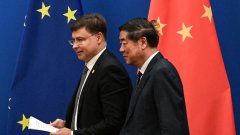
The Senate overwhelmingly backed legislation Tuesday that would require U.S. firms to notify the Treasury when investing in advanced Chinese technology on national security concerns.
That's a toned-down version of the initial Outbound Investment Transparency Act introduced two years ago, which called for restricting investment — and attracted a fair amount of pushback, according to a Senate aide.
The latest legislation, which does not require review or investment curbs, still faces a process before it can become law. It is one of several measures in a protracted backlog of proposed legislation policymakers on the Hill are rushing to clear ahead of a month-long recess in August.
The bill comes as President Joe Biden has long been expected to issue an executive order that would restrict U.S. investment in high-end Chinese tech.
The aide told CNBC that this executive order could be more far-reaching than what legislators are able to pass at this time.
The White House did not immediately respond to a request for comment after office hours.
The latest legislation in a rare bipartisan agreement, underscoring U.S. worries over China's development of advanced technology in an intensifying global .
The bill is an amendment co-sponsored by Sens. Bob Casey, D-Pa., and John Cornyn, R-Texas, as part of the broader National Defense Authorization Act. The Senate is expected to vote on the defense act by the end of the week, with both the Senate and the House likely to discuss their versions of the act early in the fall, the aide said.
"When American companies invest in technology like semiconductors or AI in countries like China and Russia, their capital, intellectual property, and innovation can fall into the wrong hands and be weaponized against us," Cornyn said in a statement.
"This bill would increase the visibility of these investments, which will help the U.S. gather the information needed to better evaluate our national security vulnerabilities, confront threats from our adversaries, and remain competitive on the global stage."
In October, the U.S. launched aimed at of key chips and semiconductor tools to China, lobbying major chipmaking nations to do the same.
On Sunday, Japan became the latest country to align with the U.S. after equipment used to manufacture semiconductors were included among 23 fresh additions to Tokyo's export control list.
Last month, the Netherlands, , one of the most important semiconductor companies in the world, on advanced semiconductor equipment. Companies in the Netherlands will need to apply for a license to export certain advanced semiconductor manufacturing equipment overseas, under rules that will come into effect on Sept. 1.
U.S. Treasury Secretary her Chinese counterparts two weeks ago that any curbs on U.S. outbound investments would be "transparent" and "very narrowly targeted." It was not clear whether she was referring to specific legislation or an executive order.
Just days before Yellen's Beijing visit, China had responded by slapping export curbs on and their compounds — which China's Ministry of Commerce the U.S. and Europe advance notice of.




